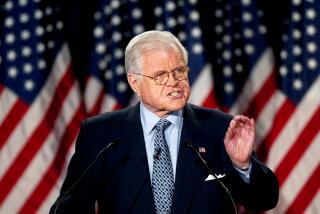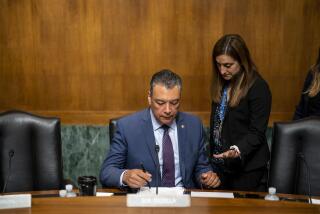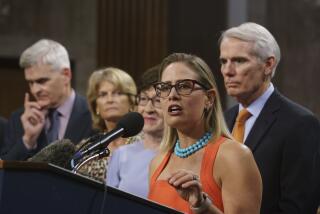Architect of the Tax Bill
- Share via
Sen. Bob Packwood (R-Ore.) has demonstrated that it still is possible for a Congressional committee chairman to be a major force in formulating national policy. The Senate Finance Committee’s 20-0 approval of a widely-applauded tax reform plan last week is a tribute to Packwood’s determination, experience and legislative skills. Packwood, 53, who first won election in 1968 by upsetting the popular maverick Wayne Morse, is known as one of the Senate’s more cerebral and forward-looking members. He has braved the wrath of the New Right in his opposition to the anti-abortion movement.
The committee’s actions have been hailed as a Packwood tour de force , but it was not entirely a one-man show. Much credit should also go to Sen. Bill Bradley (D-N.J.), who in 1979 won the seat of another popular veteran, Clifford Case, a Republican defeated in the primary. Bradley, 42, best known as a basketball star but also a Princeton graduate and Rhodes scholar, won a seat on the Senate Finance Committee. He played the role of the prudent, deferential freshman, learned the rules and paid his dues doing routine chores.
With little fanfare, Bradley fathered the most enduring and successful legislation of the 1979 energy crisis, a bill creating a national StrategicPetroleum Reserve. He was one of the few who voted for President Reagan’s budget cuts, but dared to oppose the supply-side tax cut. If enough others had followed suit, the nation would not now be saddled with more than $1 trillion in national debt.
Bradley was an independent thinker on tax policy and quickly moved away from the special interest-oriented views of other influential Finance Committee members. Four years ago, Bradley first proposed a simplified tax plan that closely resembles the bill approved by the committee on Wednesday. That is no coincidence. A number of Bradley’s colleagues say that his persistent preaching of the benefits of a fair, simple tax system was a significant factor in Wednesday’s outcome.
Bradley’s work on tax reform contradicts the pundits who claim the Democratic Party is a wandering orphan bereft of any new ideas or constructive proposals. The Bradley-Packwood one-two punch also illustrates that it still is possible for a good idea to transcend partisan politics and special interest influence.
Here’s a high-five to Packwood, Bradley et al. And for American civics teachers--a new success story.
More to Read
Get the L.A. Times Politics newsletter
Deeply reported insights into legislation, politics and policy from Sacramento, Washington and beyond. In your inbox twice per week.
You may occasionally receive promotional content from the Los Angeles Times.










